#Best Love Songs of 1973
Explore tagged Tumblr posts
Text

me when im in a introducing myself contest circa october 1973 and my opponent is steve miller
#p2#joker persona 2 innocent sin#jjba#giorno giovanna#ac#flash animal crossing#<- his french name is maurice. apparently dude wasnt in any game after the gc one which is a shame he looks fun#cowboy bebop#spike spiegel#muffin mumbles#thats the best caption i got ok. im falling asleep i had to think so damn hard aboyt that and it sucks LOL#im sorry cowboy bebop fans ive been meaning to watch it for years and i still havent...... i feel like Evil posting in your tags....#like wtf im not supposed to be here. this is not my beautiful house! this is not my beautiful wife!!#oh i guess i should tag it w the band. sorry to classic rock enthusiasts if ur seeing this in your tags TT_TT#steve miller band#but im a fake fan i havent heard most of millers stuff does he evem have stuff outside his band idk !!!!#but hit steve miller band song ''the joker'' (1973) is always looping in my head. inedd to stop typing snd send the damn post#so i can sleep!!!!! aaahhhhhh!!!!!!!!!!!!!!!!!!!!! my final message: really love your peaches wanna shake your tree. GOODBY E
10 notes
·
View notes
Photo

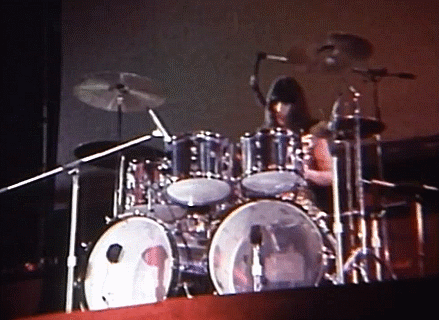

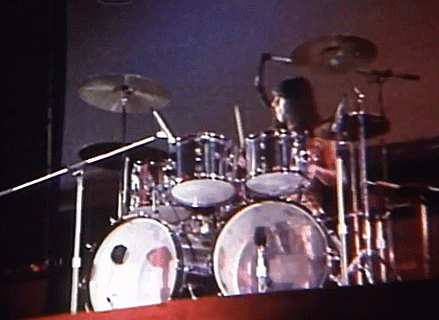




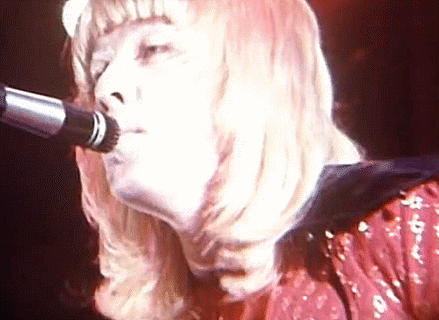

#sweet#the sweet#sweet band#ballroom blitz#1973#i am doing this now#ARE YOU READY STEVE?#UH HUH#ANDY?#YEAH#MICK?#OKAY#ALRIGHT FELLAS#LET'S GOOOOOOOOOOOOOOOOOOOOOOOOOOOOOOOOOOOOOOoooooooooooo#this is my entire childhood right here#not the video but the song#(along with multiple others)#and i am very happy about the video now that i know it#i love them so much#learning more about them was the best thing i have ever done#my boys
8 notes
·
View notes
Text
Dolly Parton - Jolene 1973
Dolly Parton is an American singer-songwriter, actress, and philanthropist. With a career spanning over fifty years, Parton has been described as a country legend and has sold more than 100 million records worldwide, making her one of the best-selling music artists of all time. She has had 25 singles reach no. 1 on the Billboard country music charts, a record for a female artist (tied with Reba McEntire). She has 44 career Top 10 country albums, a record for any artist, and she has 110 career-charted singles over the past 40 years. She has composed over 3,000 songs. She has founded a number of charitable and philanthropic organizations, chief among them is the Dollywood Foundation, which manages a number of projects to bring education and poverty relief to East Tennessee where she grew up. In response to the COVID-19 pandemic, Parton donated $1 million towards research at Vanderbilt University Medical Center, which funded the critical early stages of development of the Moderna vaccine.
"Jolene" was released on October 15, 1973, as the first single and title track from her the thirteenth solo studio album Jolene, and became Parton's second solo number one single on the country charts. "Jolene" became Parton's first top ten hit song in the UK, reaching number seven in the UK Singles Chart in 1976. It also re-entered the chart when Parton performed at the Glastonbury festival in 2014.
According to Parton, the song was inspired by a red-headed bank clerk who flirted with her husband, Carl Dean, at his local bank branch around the time they were newly married. In an interview, she also revealed that Jolene's name and appearance are based on that of a young fan who came on stage for her autograph.
During an interview on The Bobby Bones Show in 2018, Parton revealed that she wrote "Jolene" on the same day that she wrote "I Will Always Love You".
"Jolene" was nominated for the Grammy Awards for Best Female Country Vocal Performance twice, in 1975 and 1976. The first nomination was for the original recording, and the second was for a live recording from the TV series In Concert. It did not win either time, but in 2017, a cover by the a cappella group Pentatonix which featured Parton as a guest singer won the Grammy Award for Best Country Duo/Group Performance.
In 2023 she released her forty-ninth solo studio album, Rockstar, a collaborative project with a variety of rock musicians and where "Jolene" is sung by Italian rockband Måneskin, listen to it here!
"Jolene" received a total of 94,3% yes votes!
youtube
5K notes
·
View notes
Text
I love finding out there's weird drama behind a song.
So, in 1967, a french songwriter named Jacques Revaux composes as song called "Comme d'habitude" (As Usual) with lyrics by Claude François and Gilles Thibaut. Claude François releases a version with him singing it, and it's enough of a hit that some music execs are trying to get someone to do an English version.
David Bowie's publisher happened to share an office with another publisher who brings in the record, and Bowie's publisher suggests Bowie could sing it. Bowie's manager thinks it's a sure-fire hit: He thinks Bowie is a good singer and lyricist, but not so good a composer, so by using the music of Jacques Revaux and Bowie's lyrics and voice, it'll easily sell lots of copies.
Bowie writes new lyrics, calls his version "Even a Fool Learns to Love", and records a demo in 1968. The French publishers of the original song turn him down, however: They want some big name singer if they're gonna sell the rights, not some unknown "David Bowie" guy (Space Oddity wouldn't be until 1969, so he wasn't a star yet, especially internationally).
So Paul Anka enters the picture, after hearing the song on French radio while on holiday. He's been a successful songwriter since the 50s, and he's a big enough star that the publishers of "Comme d'habitude" agree to sell him the rights (for 1 dollar. But Jacques Revaux's label retains the rights to the music, so they get royalties).
He then has a meeting with a singer and "some mob guys". The singer says he's getting out of the music business, he's sick of it. Paul Anka rewrites the lyrics to be about that idea: at the end of your career, looking back, and not having any regrets. He calls up the singer and offers the song.
in 1969, Frank Sinatra releases "My Way" to immediate success.
And this pisses Bowie off. He was going to release a version of "Comme d'habitude"! He wrote his own lyrics and even recorded it! Reportedly he was angry about this for a year, and decides "screw it, I can write a big song like that!". So he does, makes it sound "a little like My Way", and
So in 1971 he writes "Life on Mars?", as a parody of "My Way" and proof he can write songs like "My Way". It's included on his 1971 album Hunky Dory, and released as a single in 1973.
And since it's considered one of his best songs (as well as one of the best songs of all time), I guess he really succeeded in proving he could do that.
But yeah. Listening to "Life on Mars?" I never would have guessed it was connected to Frank Sinatra's "My Way"
329 notes
·
View notes
Text
Funky Basslines
I’ve compiled another very subjective list with the 15 of the best songs with an awesome funky basslines.

The Devil Is Gonna Get You -The Future Kind (Dave Hamilton's Detroit Funk (Rare And Unreleased Twisted Funk 1967-1975, 2006)
Enfer et Marijuana - Andy Loore (Ambiance Rythmes Vol. 5, 1970)
Good Time - George Campbell (So Much Love / Good Time, 1973)
I Cry - Millie Jackson (It Hurts So Good, 1973)
I Think It's A Big One Coming - Leonard (Lil' Man) Kaigler (I Think It's A Big One Coming / You Got Me Believing In You (Dreamin' 'Bout You), 1974)
Lahilaha Illallahu - Afro Express (Asalam Aleikum,1976)
Let Me Tell You What I Found Out - Herman "Hack" Bartholomew – La La You / Let Me Tell You What I Found Out, 1970)
The Lord Don't Know Nothing 'Bout Unemployment (He's Working Overtime) - Leslie Isaiah Gaines & the Voice of the People (The Lord Don't Know Nothing 'Bout Unemployment (He's Working Overtime) / The Lord Don't Know Nothing 'Bout Unemployment (He's Working Overtime), 1983)
Napoli Si Ribella - Franco Campanino (Napoli Si Ribella (Colonna Sonora Originale Del Film), 1977)
Ratty Ratty - Maskman (Ratty Ratty / Sitting On Your Doorstep, 1972)
Roots Talk - Mabrak (Ital Talk - Liquid Talk, 1976) - Jamaica
Runnin' Wild (Ain't Gonna Help You) - The Scott Three (Runnin' Wild (Ain't Gonna Help You) / Gotta Find A New Love, 1971)
Suffering Wrath - Rudy Love and The Company Soul (Suffering Wrath / Life Ain't So Bad, 1970)
Wait… No Hurry - Grotto-II (Wait… No Hurry, 1978)
Zina - Ouiness (Bahebek Mara / Zina, 1979)
More Funky Basslines
Funky Bass in 21 songs
30 Funky Basslines
Best Funky Bass Lines : 25 tracks
Bass in Gospel: Bass for Believers
More Funky Basslines
Funky Basslines in Soul Music, part 5
Top 10 basslines in Soul and Funk Music, part 4
Top 10 basslines in Soul and Funk Music, part 3
Top 10 basslines in Soul and Funk Music, part 2
Top 10 basslines in Soul and Funk Music, part 1
105 notes
·
View notes
Text
I'm shocked (not really, but it's shocking to hear this anyway) to learn that at some point in life Priscilla sued Marty Lacker for a money Elvis gave him. She dropped the lawsuit when Marty counterclaimed it. Marty says "She messed with the wrong guy, but she was trying to use me as a test case against the other guys. She is a lovely person."
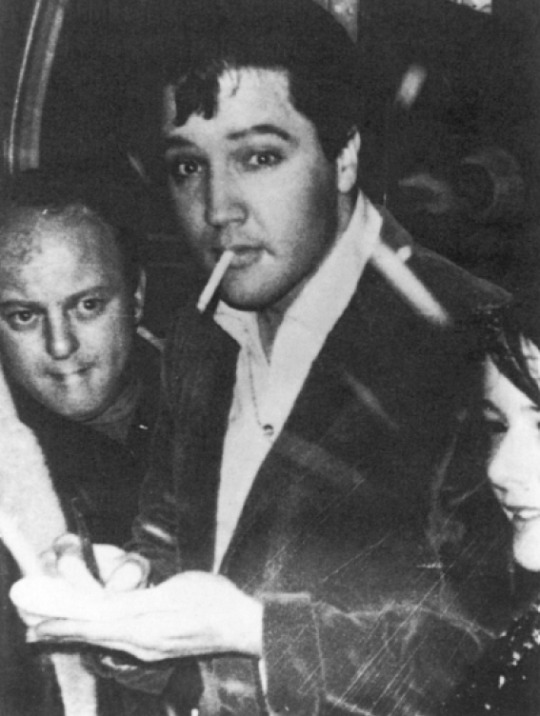
(1) February 25-26, 1965: Elvis signing autographs for fans in Nashville while he was in town for the recording session for the "Harum Scarum" movie soundtrack. Marty Lacker is seen by Elvis' side.
YOUTUBE - INTERVIEW WITH MARTY LACKER BY JOE KREIN PART 3 (out of 4) (go to 30:00 to listen his story about the lawsuit by Priscilla)
Now, this is just my personal comments on this but for all I've learned about Marty Lacker so far I believe he had the best interests at heart concerning Elvis. He helped EP with his music career A LOT. The way he puts it, it seems he worried with Elvis' name in the business because: 1. Marty knew EP had so much to offer (as everybody else knew), so much talent to go to waste on unworthy movies and its soundtracks and on general commercially weak songs, and 2. I bet it wasn't funny to see people mocking his friend for the kind of music and movies Elvis was making. Marty, as well as some other Memphis Mafia guys, worried about Elvis' personal satisfaction and well-being for multiple reasons... maybe not all of them being selfless but I still believe they did care about Elvis as a friend and human being even if they had hidden interests and whatever was the nature of them.
Now, all of those guys (all the people) around EP were seeing him killing himself little by little while trying to numb the disturbing thoughts in his mind and the sorrow in his soul... they were witnessing all of the sad incidents happening over the years where Elvis would end up hurting himself or almost dead. Marty was one of the few people that would go against Colonel Parker when he convinced Elvis to try something new for his career, something that would end up giving Elvis a great refreshing moment in his life, something he was hoping for deep down but somehow couldn't imagine how to make it happen himself and the ones who were in the place to advice him were too busy with their own personal agendas to care about the King's aspirations for his career.
Marty was the one to manage getting Elvis into the American Sound studio (later at the Stax too), and Marty was also the one to recommend the Sweet Inspirations to work on Elvis' concerts. Just by that alone, ALONE, could you really think Marty deserved a lawsuit for a money Priscilla didn't even need? I mean, where is the gratitude to some of the close friends of the man she allegedly says she loved?
As he said in the same interview, Marty was no saint… he wasn't a leech either. There was a time when Elvis lent him some money and Marty paid him back some time later, so Elvis was deeply touched by it because normally no one would pay him back ever! That shows something, right?
Maybe I don't know enough yet because I'm relatively a new born in the Elvis fandom, and I absolutely don't agree with every statement I've listened/read coming from Marty but in general I see him as one of the good guys from the Memphis Mafia bunch. I mean, every story has two sides. Maybe Priscilla sued Marty after being counselled to do so by some lawyer she had, like she was when she decided take Elvis to the court again in 1973, asking for more money after the divorce settlement had been set in 1972 - and by this I mean she could've been convinced to sue Marty instead of having the idea herself, which at least would make things a little less awful. But any reason she had to do that, I mean... why? There's things in life we just don't do. Even if she didn't personally liked the guy (and we know from Elvis' friends the ones she really liked were Joe Esposito and Jerry Schilling), she had to admit Marty was a great contributor to the Elvis Presley estate from which she benefits until today. I think for all Marty did for Elvis' career it's reasonable to think that any money he could've borrowed from EP would have already made its way back into the Presley's bank account in other ways. Maybe a little bit of gratitude and respect to him wouldn't hurt. I mean, I'm not totally against Priscilla... in some ways I can understand her, I really can, but not on this. Not when it comes to her greediness.
I just wonder what would Elvis think.
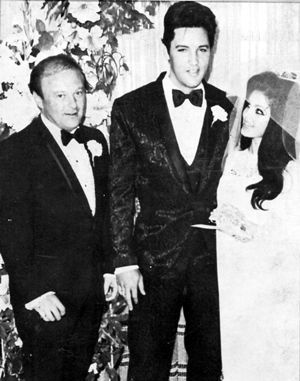
(2) The Presley's wedding day, February 1, 1967. Marty with Elvis and Priscilla.
FURTHER INFO: On July 17 1973, "in the papers presented to the court Priscilla's new attorney seeks to set aside the original divorce settlement." - Excerpt from 'Elvis Day by Day' by Peter Guralnick and Ernst Jorgensen. Now in addition to what has been agreed on the August 1972 divorce settlement, from the 1973 new settlement Priscilla would also receive, among other things, Spousal support, additional $625,000 (in cash) to the original $100.000 agreed and 5% of Elvis' royalties.
64 notes
·
View notes
Text
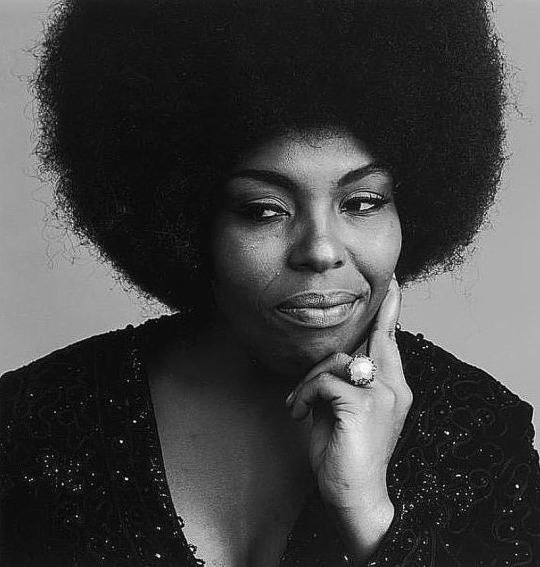
Today In History
Roberta Flack, internationally hailed as one of the greatest songstresses of our time, was born on this date February 10, 1939 in North Carolina.
She remains unparalleled in her ability to tell a story through her music. Her songs bring insight into our lives, loves, culture and politics, while effortlessly traversing a broad musical landscape from pop to soul to folk to jazz.
Ms. Flack is the only solo artist to win the GRAMMY Award Record of the Year for two (2) consecutive years: The First Time Ever I Saw Your Face won the 1973 GRAMMY and Killing Me Softly with His Song won the 1974 GRAMMY.
Some of her best-known songs are: “The First Time Ever I Saw Your Face,” “Where Is the Love (a duet with former Howard University classmate Donny Hathaway),” “Killing Me Softly With His Song,” “Feel Like Makin’ Love,” “The Closer I Get to You,” “Tonight I Celebrate My Love,” and “Set the Night to Music.”
Roberta Flack has inspired countless artists with her musical brilliance and honesty.
CARTER™️ Magazine
#roberta flack#carter magazine#carter#historyandhiphop365#wherehistoryandhiphopmeet#history#cartermagazine#today in history#staywoke#blackhistory#blackhistorymonth
113 notes
·
View notes
Text
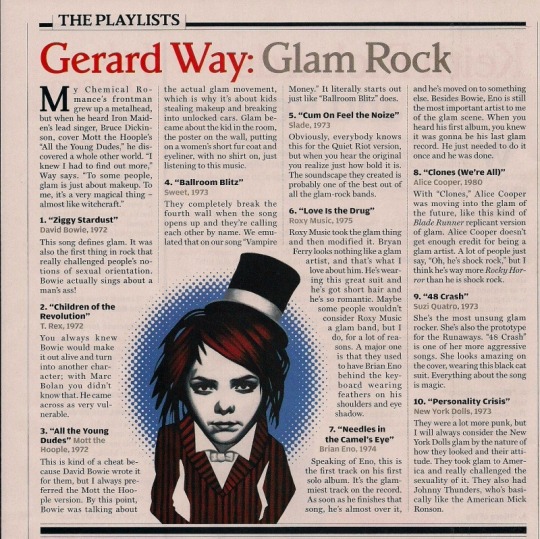
Rolling Stone #1119 December 9, 2010 - The Playlist Issue
(click for better quality) Here's the playlist if you want to take a listen! Transcript:
Gerard Way: Glam Rock
My Chemical Romance's frontman grew up a metalhead, but when he heard Iron Maiden's lead singer, Bruce Dickinson, cover Mott the Hoople's "All the Young Dudes," he discovered a whole other world, "I knew I had to find out more," Way says, "To some people, glam is just about makeup. To me, it's a very magical thing almost like witchcraft."
1: "Ziggy Stardust" David Bowie, 1972
This song defines glam. It was also the first thing in rock that really challenged people's notions of sexual orientation. Bowie actually sings about a man's ass! 2: "Children of the Revolution" T. Rex, 1972
You always knew Bowie would make it out alive and turn into another character; with Marc Bolan you didn't know that. He came across as very vulnerable. 3: "All the Young Dudes" Mott the Hoople, 1972
This is kind of a cheat because David Bowie wrote it for them, but I always preferred the Mott the Hoople version. By this point, Bowie was talking about the actual glam movement, which is why it's about kids stealing makeup and breaking into unlocked cars. Glam became about the kid in the room, the poster on the wall, putting on a women's short fur coat and eyeliner, with no shirt on, just listening to this music. 4: "Ballroom Blitz" Sweet, 1973
They completely break the fourth wall when the song opens up and they're calling each other by name. We emulated that on our song "Vampire Money." It literally starts out just like "Ballroom Blitz" does. 5: "Cum On Feel the Noize" Slade, 1973
Obviously, everybody knows this for the Quiet Riot version, but when you hear the original you realize just how bold it is. The soundscape they created is probably one of the best out of all the glam-rock bands. 6: "Love Is the Drug" Roxy Music, 1975
Roxy Music took the glam thing and then modified it. Bryan Ferry looks nothing like a glam artist, and that's what I love about him. He's wearing this great suit and he's got short hair and he's so romantic. Maybe some people wouldn't consider Roxy Music a glam band, but I do, for a lot of reasons. A major one is that they used to have Brian Eno behind the keyboard wearing feathers on his shoulders and eye shadow.
7: "Needles in the Camel's Eye" Brian Eno, 1974
Speaking of Eno, this is the first track on his first solo album. It's the glammiest track on the record. As soon as he finishes that song, he's almost over it, and he's moved on to something else. Besides Bowie, Eno is still the most important artist to me of the glam scene. When you heard his first album, you knew it was gonna be his last glam record. He just needed to do it once and he was done. 8: "Clones (We're All)" Alice Cooper, 1980
With "Clones," Alice Cooper was moving into the glam of the future, like this kind of Blade Runner replicant version of glam. Alice Cooper doesn't get enough credit for being a glam artist. A lot of people just say, "Oh, he's shock rock," but I think he's way more Rocky Horror than he is shock rock. 9: "48 Crash" Suzi Quatro, 1973
She's the most unsung glam rocker. She's also the prototype for the Runaways. "48 Crash" is one of her more aggressive songs. She looks amazing on the cover, wearing this black cat suit. Everything about the song is magic. 10: "Personality Crisis" New York Dolls, 1973
They were a lot more punk, but I will always consider the New York Dolls glam by the nature of how they looked and their attitude. They took glam to America and really challenged the sexuality of it. They also had Johnny Thunders, who's basically like the American Mick Ronson.
#can not describe the feeling of finding what issue this belonged to but man was it good#gerard way#glam rock#rolling stone magazine
488 notes
·
View notes
Text
John Lennon by his friends and son: ‘He got eight years more than Jesus’
The former Beatle would have been turning 84 this autumn. Now his son Sean and those who knew him best are keeping his spirit alive with the rerelease of his classic solo album Mind Games
Everyone wonders what John Lennon could have become. When he was murdered in New York on December 8, 1980, the 40-year-old was in his post-Beatles prime. The superb album Double Fantasy had just come out and he was plotting a world tour. His second son, Sean, whom he took time off to bring up with his wife, Yoko Ono, was five, and Lennon was feeling inspired. Seven solo records since the Beatles had split ten years earlier; a reconciliation with Paul McCartney.
“Everyone gets the time they get, and he got eight years longer than Jesus,” says Bob Gruen, the rock’n’roll legend who took photographs of everyone who mattered in the 1970s. He captured Lennon and Ono’s time in New York and is confident and chatty — until conversation turns to what Mark Chapman took outside the Dakota that day.
“John should be alive now,” Gruen says, clearly still affected 44 years on. Gruen had spent the weekend with Lennon before he died and was developing his photos when he got the call. “He didn’t die in an accident or of a disease. His death broke my trust in everything. He was grounded at the time. He learnt a lot from raising his son, about enjoying his life and being sober. Then I heard he was dead.”
Lennon would have been 84 in October — and at least we are left with his songs. But legacy is complicated. Over the years McCartney has stolen his crown as chief creative in the Beatles. Partly because Lennon is no longer here to speak. Also because, during Peter Jackson’s 2021 film, Get Back, Lennon was largely stoned, while the charismatic McCartney conjured up magic. So to redress the balance, this month’s innovative rerelease of Lennon’s Mind Games (1973) pushes design and immersion in ways few box sets have before. It features new mixes — some that amplify Lennon’s voice, others that emphasise the instruments.
It is the work of Sean, 48, who has been at the forefront of the Mind Games rerelease. Lennon’s younger son is a musician and artist based in New York near his mother, 91. “The title track is one of the most beautiful songs ever written,” he says.
The songs answer questions Sean never got to ask his father. Despite being very young when his father was around, Sean does have memories of him — talking, watching TV, playing guitar and saying, “Good night, Sean.” The song Aisumasen (I’m Sorry) on the record is an apology from Lennon to Ono.
“One thing that distinguishes my dad’s solo career,” Sean says, “is how personal his lyrics became. It is like a diary, and it is my duty to bring attention to my father’s music. Not just my duty to him, but a duty to the world. With the world as it is now, people have forgotten so many things that I never imagined could be forgotten. I refuse to let that happen to this music — it means too much to me.”
Two years before Mind Games came out, Lennon moved to New York and met Gruen. Living in New York was simpler for him and Ono. They were hounded in Britain. “One paper called Yoko ugly,” Gruen recalls. “But in New York they were just treated as the quirky artists who came to town.”
Gruen’s eyes light up. “He was just funnier than everyone else,” he says. “I’d have loved him on Twitter, he was so cool with one-liners.” He smiles. “And, also, he learnt to cook. I’d always try to go to the Dakota for mealtimes.” What sort of food? “John used to be a meat and potatoes guy, but he met [the actress] Gloria Swanson in the vegetable store and she gave him a book that acted as a way into a macrobiotic diet from a western one. He got really into healthy food, baking vegetables and steaming fish.”
And this is the frustration. In the late 1970s Lennon was cleaning up his act. For himself, for Sean — a son he was involved with, as opposed to his first child, Julian. He had changed, from the man who went on his fabled “Lost Weekend” in Los Angeles in 1973. The weekend actually ran for months, during which Lennon left Ono, on Ono’s suggestion, for their assistant, May Pang, then 23. After Lennon went back to Ono, Pang carried on in the music business and married the producer Tony Visconti, but the Lost Weekend era remains her headline. During that time Lennon enjoyed chaotic recording sessions with Phil Spector. “I wondered if he’d ever make it back to New York,” Gruen says. “I thought he might get a place in Hawaii, or just die.” But Lennon returned in 1974, for his final six years.
What does Gruen think about how Lennon is remembered? Especially in Get Back? “Well, who’s the last one standing?” Gruen scoffs. “Who gets to write the history? The survivors get to write the history. That’s the way it goes.”
Tony King was the vice-president of Apple Records at the time of Lennon’s Lost Weekend. “We’re here to talk about my friend,” he tells me sweetly. King was out in Los Angeles working on a Ringo album when Pang phoned to say that Lennon needed help with his Mind Games record.
“I wasn’t looking forward to it,” King admits. “John could be sharp-tongued. But, in LA, he was super-friendly. I was straightforward. I told him he had to repair his reputation. After Imagine [1971] he’d gone in a different direction, making songs with a political edge. It was quite easy for John to get caught up in things. He had this tendency to see someone, decide he loved them and then go in their direction. I was lucky he went in my direction for a while. He realised he had lost some fans. Mind Games was more what people wanted.” Its songs were simpler and less political.
Personally, however, Lennon was in turmoil. “May on one arm, Yoko on the other!” King says. “He was juggling a lot.” Did Lennon talk about McCartney? “They were not getting along, but he was still fond of him,” King recalls. And what about that Lost Weekend era? “He was off the walls, to be honest.
“We went to Las Vegas and John interrupted Frankie Valli during a show, saying, ‘Get your cock out!’ We got thrown out and on the way back to the hotel he was pissing up against trees and then throwing his chips around the lobby. I put him to bed. It was difficult when he drank. John had taken way too much acid and so when he drank it flipped him into another style of person. One day it was great, the next it was very hard.”
King remembers the night his friend died clearly. “I was out at dinner in LA and the waiter said, ‘He’s dead.’ I returned to a very lonely, sad hotel room.” Does he ever think about what Lennon might have achieved later in his life? “Elton and I talk about John,” King says. He means Elton John. “We say, ‘I wonder what he’d be up to?’ Well, he’d have pounced on the internet and got into AI. And he’d still campaign. I could see him hopping on a plane to see Zelensky. He was a busy person, with an arresting personality. You’re never going to forget him.”
The Mind Games reissue is a beast, a lavish celebration of a fine, melodic rush of songs. Bonuses include the Ultimate Mixes, which bring Lennon’s voice to the fore; Raw Studio Mixes; there is a Super Deluxe Edition “presented in a 13in cube”; puzzles; and even an experience on the free Lumenate app that is described as a “consciousness-expanding psychedelic meditation” and uses the phone’s torch and Lennon’s tunes to guide users into “a state of consciousness between deep meditation and psychedelics”.
We are a long way from 1973 — when the session musicians David Spinozza, on guitar, and Ken Ascher, on keyboards, were asked to play on Mind Games. They recall the recording as efficient — Lennon left his partying for later. He was in a creative peak, with Mind Games his fourth album in three years since the Beatles.
“He was a Beatle!” Ascher says. “I was thrilled to get the call. Yoko told me, around 10pm, that John would like to meet. I called my wife and said, ‘I’m not coming home — I’m meeting John.’ He played me music he liked, and we talked for hours. His humour helped me relax.”
Spinozza worked with Lennon and McCartney in the 1970s. How did the men compare? “Paul would do one song for six hours, even for a day,” he says. “With John we never worked on one song for six hours. He worked quick — he was all business. I’m not saying one was better than the other, but Paul could work on a drum sound for hours. John just wanted to get it done.”
How does Sean feel about his parents, looking back? “Their story is a love story,” he says. “They found each other across a great divide and certainly struggled through ups and downs, but never doubted their love. It is important we remember them as an example. Even through rough patches you can see my father thought about my mother. They were simply, irrevocably intertwined.”
Lovely words — and as for John Lennon himself? “Generally it’s whatever comes out, like diarrhoea,” he once said of his recordings. “A bit personal, a bit political — someone told me Mind Games was Imagine with balls, which I liked. It was like an interim record between being a manic political lunatic back to a musician again.”
Speaking in the early 1970s, after a decade of super-fame, he said he did not feel different to how he had before. “I’m still a bit adolescent,” he said in one of his final interviews. “My old friends from Liverpool got jobs after school. I’d see them six months later and their hair would be thin and they’d be getting fat. They were becoming old men — while I just keep going.”
(source)
#god save me from mainstream beatles articles#still some interesting snippets#john lennon#sean lennon#paul mccartney
25 notes
·
View notes
Text

🔸Pre-Queen Singles Discography🔸
Today, on June 29th, 1973 - 'Pre-Queen' Story!
'I Can Hear Music' / 'Going Back' released in the UK, Germany and USA
🔸In the summer of 1972, Trident Studios' in-house engineer Robin Geoffrey Cable instigated an experimental project in an effort to emulate the "wall-of-sound" style made famous by Phil Spector. Queen happened to be recording their debut album in the studios at the time, so he invited Freddie Mercury to lay down the lead vocals who, in turn, roped in Brian May and Roger Taylor to provide percussion, guitar and backing vocals - as paid session musicians.
In June 1973, shortly before Queen's own debut album was released, EMI decided to cash in on the emerging glam rock trend and rushed out the resulting recordings as a 7" single under the name of Larry Lurex - an obvious send-up of Gary Glitter.
source ➡️ discogs.com
🔸The Ronettes (and later Beach Boys) classic 'I Can Hear Music' was recorded that summer in Trident Studios and features (per Freddie's insistance) Roger Taylor on drums and Brian May on guitar. The single was released in the UK a week before Queen's first album, becoming the first solo product by a Queen member. Freddie insisted the Queen name not be used for the release, so it was released under the pseudonym Larry Lurex.
🔸'Goin' Back' is best known as a 1966 single by Dusty Springfield. The song written by Carole King and Gerry Goffin and was recorded by a number of artists including The Byrds, Phil Collins and eventually Carole King herself.
The song was used as the B-Side to the Larry Lurex single "I Cant Hear Music".
source ➡️ queenvault.com
👉 'Mother Love' (taken 'Made In Heaven' album, 1995) ends with first strophe of song 'Going Back'
📸 Pic: 2016 Freddie Mercury 'Messenger Of The Gods' Boxed Set 7" Sleeve
#pre queen#1973#larry lurex#i can hear music#going back#queen#brian may#john deacon#freddiebulsara#legend#zanzibar#roger taylor#queen band#london#freddie mercury#uk#germany#usa#mother love#made in heaven album#1995#released#Spotify
29 notes
·
View notes
Text
by Shiryn Ghermezian
Academy Award-winning Jewish American songwriter Richard M. Sherman, one of the creative geniuses behind some of Walt Disney’s most iconic and timeless songs, died on Saturday at the Cedars-Sinai Medical Center in Beverly Hills “due to age-related illness,” the Walt Disney Company announced. He was 95 years old.
The Walt Disney Company described Sherman as “one of the most prolific composer-lyricists in the history of family entertainment, and a key member of Walt Disney’s inner circle of creative talents.” The company added that it will announce at a later date its plans for celebrating Sherman’s life.
“Richard Sherman was the embodiment of what it means to be a Disney Legend, creating along with his brother Robert the beloved classics that have become a cherished part of the soundtrack of our lives,” said Bob Iger, CEO of The Walt Disney Company. “From films like Mary Poppins and The Jungle Book to attractions like ‘It’s a Small World,’ the music of the Sherman Brothers has captured the hearts of generations of audiences. We are forever grateful for the mark Richard left on the world, and we extend our deepest condolences to his family.”
Sherman and his late brother, Robert B. Sherman, made up the songwriting team known as the Sherman Brothers. Together they wrote music for the 1964 film Mary Poppins, including “Chim Chim Cher-ee,” “Supercalifragilisticexpialidocious,” “A Spoonful of Sugar,” and the lullaby “Feed the Birds.” The brothers won the Oscars for Best Score – Substantially Original and Best Original Song for “Chim Chim Cher-ee.” “Supercalifragilisticexpialidocious” made it on the Billboard Hot 100 chart in 1965 and “Feed the Birds” was one of Walt Disney’s favorite songs.
“You don’t get songs like ‘A Spoonful of Sugar’ without a genuine love of life, which Richard passed on to everyone lucky enough to be around him,” said Pete Docter, chief creative officer of Pixar Animation Studios. “Even in his 90s he had more energy and enthusiasm than anyone, and I always left renewed by Richard’s infectious joy for life.”
Born on June 12, 1928, in New York City, Richard’s family relocated to Beverly Hills in 1937. He attended Beverly Hills High School and later studied music at Bard College. He was drafted into the United States Army and served as conductor for the Army band and glee club from 1953 to 1955.
Walt Disney hired the Sherman brothers as staff songwriters for The Walt Disney Studios after the success of their song “Tall Paul,” which sold more than 700,000 singles. The brothers together ultimately wrote more than 200 songs for some 27 Disney films and 24 television productions. Their credit included The Horsemasters (1961), The Absent-Minded Professor (1961), The Parent Trap (1961), Summer Magic (1963), The Sword in the Stone (1963), That Darn Cat! (1965), Winnie the Pooh and the Honey Tree (1966), The Jungle Book (1967), The Happiest Millionaire (1967), The Aristocats (1970), Bedknobs and Broomsticks (1971), and The Tigger Movie (1998). Richard later wrote new lyrics for the live-action The Jungle Book in 2016 and two years after appeared in the film Christopher Robin, for which he also composed three new songs.
The Sherman brothers also wrote music for Disney theme park attractions around the world, including “There’s a Great Big Beautiful Tomorrow,” “The Tiki, Tiki, Tiki Room,” and “It’s a Small World.” In the early 1980s, they wrote songs for EPCOT and Tokyo Disneyland, including “One Little Spark” and “Meet the World.”
The Sherman brothers left The Walt Disney Studios in the early 1970s and went on to write music, songs, and screenplays for films such as Chitty Chitty Bang Bang (1968), Snoopy Come Home (1972), Charlotte’s Web (1973), The Adventures of Tom Sawyer (1973), Huckleberry Finn (1974), and The Slipper and the Rose (1976).
In 1972, the duo became the only Americans to ever win 1st Prize at the Moscow Film Festival for their film musical The Adventures of Tom Sawyer, for which they wrote the script and music. The brothers were inducted as Disney Legends in 1990 and into the Songwriters Hall of Fame in 2005. Three years later, the brothers were awarded the National Medal of the Arts.
In 2010, Richard and award-winning composer John Debney collaborated on the song “Make Way for Tomorrow Today” for Marvel Studios’ Iron Man 2.
Over the course of his 65-year career, Richard received nine Academy Award nominations, won three Grammys, and received 24 gold and platinum albums. Richard’s father, Al Sherman, was also a songwriter.
44 notes
·
View notes
Text
In their 2024 national convention, Democrats reclaimed the mantle of freedom.
It’s about time.
The first indication was Vice President Harris’s choice of Beyoncé’s song “Freedom” as her campaign anthem. It has been playing at her rallies and it played at the end of the film before her entrance onto the stage. In addition to placards that said, “Thank you Joe” or “Vote” or “Coach Walz,” the DNC had thousands of placards printed for the delegates to wave that simply read, “Freedom.” Many of the convention speeches invoked the term in some way. Governor Walz’s acceptance speech for the vice presidency was especially heavy on it:
“Freedom. When Republicans use the word freedom, they mean that the government should be free to invade your doctor’s office. Corporations—free to pollute your air and water. And banks—free to take advantage of customers.
“But when we Democrats talk about freedom, we mean the freedom to make a better life for yourself and the people that you love. Freedom to make your own health care decisions. And yeah, your kids’ freedom to go to school without worrying about being shot dead in the hall.”
Freedom was an especially welcome theme in this convention because, in recent political history, Democrats ceded freedom to the Republicans. This was wrong. Nothing is as central to America’s cultural DNA as freedom. After all, we as a nation were born out of a desire for freedom from King George.
One of the seminal speeches of the 20th century was President Franklin Delano Roosevelt’s 1941 State of the Union address. In it, he announced what he called the “Four Freedoms”—freedom of speech and expression, freedom of worship, freedom from want, and freedom from fear—principles that were incorporated into the war aims of the Allied Powers, and eventually into the UN’s Universal Declaration of Human Rights.
A generation later, the Civil Rights Movement marched for freedom from the oppression of segregation and unequal citizenship, goals that the modern Democratic Party embraced. After the Roe v. Wade decision was handed down in 1973, Democrats defended women’s freedom to choose against conservative attempts to restrict access to abortion, and even to prohibit it nationwide.
Since the 1980s, however, Republicans claimed freedom for themselves; starting with the presidency of Republican Ronald Reagan, they narrowed it to mean free markets and limited government. This redefinition rested on the argument that government represented the main threat to freedom, which is at best a half-truth. Yes, government can become oppressive. But weak government can also pose a threat to freedom. Citizens cannot live free from fear unless government minimizes threats to the security of persons and property as citizens act within the structure of law. They cannot enjoy freedom from want unless government protects markets from force, fraud, and threats to competition, and unless it protects individuals from economic privation. In his 1944 State of the Union, FDR declared: “Necessitous men are not free men. Men who are hungry and out of a job are the stuff of which dictatorships are made.”
Despite the power of such arguments, modern Democrats have found it difficult to persuade the electorate that they were the true champions of freedom. And then in 2022, the Supreme Court handed down the Dobbs decision, which overturned Roe v. Wade and jeopardized women’s freedom of choice across the nation. The reaction has been striking; with one decision, the government was suddenly in the middle of the most personal decisions women and men could make.
Since then, not a month has passed without some horror story making national news about a woman denied abortion care that could save her life and/or her fertility. On stage at the Democratic convention, some of these women told their heartbreaking stories. Since then, abortion has been on the ballot in seven states—many of which, like Kansas and Kentucky, are conservative, deep red states. And in every single instance, the pro-choice position won. Since then, abortion has played a major role in the Virginia legislative elections, the congressional midterm elections, and many special elections. In 2024, abortion referendums will be on the ballot in eight states, two of which, Arizona and Nevada, are swing states and where the issue may very well bring out young Democratic voters.
Against this backdrop, it’s not surprising that Harris’s speech spent more time on abortion than any other single policy issue. Her unique ability to prosecute this issue was evident back when she was a senator from California who asked then-Supreme Court nominee Brett Kavanaugh if he could think of a law that controlled men’s bodies. In addition to warning the country about Republican plans to take away reproductive freedom by enacting a national abortion ban and installing a national anti-abortion coordinator in the White House, Harris expanded on threats to freedoms.
“In this election, many other fundamental freedoms are at stake. The freedom to live safe from gun violence—in our schools, communities, and places of worship. The freedom to love who you love openly and with pride. The freedom to breathe clean air, drink clean water, and live free from the pollution that fuels the climate crisis. And the freedom that unlocks all the others. The freedom to vote.”
Beyond the articulation of a freedom agenda, the speech had other tasks, which Harris crisply carried out. She introduced herself to the country as a child of a middle-class family and declared that building a strong middle class would be one of the defining purposes of her administration. To that end, she advanced her vision of an “opportunity economy” where everyone would have a chance to compete and where success for some need not mean failure for others.
Harris took on inflation and immigration, two areas of potential vulnerability for her campaign. She promised to bring down prices of everyday goods and services and to attack the nation’s housing crisis. On immigration, she sought to turn the tables on Donald Trump, reminding her audience that he had subverted a bipartisan reform bill that would have helped secure the border.
Surprising some observers, Harris laid out a tough agenda on defense and foreign policy, promising to maintain the strongest and most lethal fighting force in the world, retain our leading position in NATO, defend Ukraine against Russian aggression, stand up against Iran and North Korea, and take democracy’s side in the struggle with tyranny. She articulated a firm pro-Israel stance while mentioning the suffering of Gaza’s inhabitants and endorsing Palestinians’ right to dignity and self-determination.
Taken as a whole, Harris’s acceptance speech positioned her as a center-left Democrat in the mold of Joe Biden rather than Bernie Sanders. It embraced what she termed the pride and privilege of being an American. And as if to show that Republicans have not cornered the market on patriotism and American exceptionalism, she told her audience that together, they had the opportunity to write the next chapter of the most extraordinary story ever told. She ended her speech in the most traditional way imaginable, by asking God to bless the United States of America.
Harris’s speech, which the convention received with unfeigned enthusiasm, did nothing to interrupt the momentum of one of the most explosive campaign launches in American history.
20 notes
·
View notes
Note
more on dissociative armand- some songs that i feel fit him & this headcanon very well because i cant not relate him to songs (my armand playlist is something like 17 hours long at this point, not including 3 separate ones that are also for him)
- Christine by Siouxsie and The Banshees
“she tries not to shatter, kaleidoscope style, personality changes behind her red smile, every new problem brings a stranger inside, helplessly forcing one more new disguise”
Now, this song is actually about a woman named Christine with DID, but with this headcanon the songs, and particularly these opening lyrics match up with Armand very well, both with his disconnect between Armand, Amadeo and Arun and with his intense masking to hide his abnormalities and discomforts.
- Valley of the Dolls by Marina (and the Diamonds)
“Born with a void, hard to destroy with love or hope, built with a heart, broken from the start”
&
“Living with identities that do not belong to me”
&
“Pick a personality for free, when you feel like nobody”
This song has a whole lot of thing that feel very Armand so i’ll go in order of the lyrics.
The first set of these lyrics definitely reminds me of Armand thinking and talking about his own past and what little he remembers of it. When he is talking to Daniel in 1973 he uses the metaphor of a black hole to talk about the absence of a meaningful self or life, which he projects onto Daniel even as it relates to himself a lot more. Armand is always a character that is sort of “doomed from the start”, his narrative of horrors and dehumanisation beginning at such a young age (even with things like “not made from human hands”) that he doesn’t really know anything else. He doesn’t have any sense of self than a void, and his heart really is broken from the start, never really being able to love someone or understand love at all. (“would he recognise love, if he were to experience it?”)
The second set of lyrics add onto this and the HC of dissociative disorders/ his identities really being separate. The identities of Amadeo and Armand never did belong to him, they were given to him, assigned to him by Marius and Allessandra respectively. Then there is Arun, who he doesn’t remember. He doesn’t know if that was his true name at all and all he does remember is when that life and identity was taken from him. It doesn’t come back up until his relationship with Louis, and when it starts to be used in their unhealthy Dom/Sub relationship, it again doesn’t belong to him, but to Louis.
The third set of lyrics really is an add on to the second, Armand doesn’t really feel like anyone, he has no fixed identity, so he keeps choosing different parts to play to please or serve whoever he’s around and what they want, be it Lestat, the theatre coven, Louis or Daniel. These come so easily and freely because it’s all he knows, it’s not putting a mask over a real person, its becoming another phantom of a person that he has always been.
- Another Marina song, Fear and Loathing
“I’ve lived a lot of different lives, been different people many times, I lived my life in bitterness, and fill my heart with emptiness”
&
“Got different people inside my head, I wonder which one that they like best, I’m done with trying to have it all, and ending up with not much at all”
I don’t really have anything to say here that wouldn’t be repeating what I said for Valley of the Dolls as it’s very much the same thing, but these lyrics are too fitting not to also mention, and this song is So Very Armand both in lyrics and sonically, it has that perfect dreamy-gentle yet heartbreaking tone.
Last but not least Identity by X-Ray Spex gives me a very similar vibe even if the tone is very different (a classic punk song). I can’t really say much about the lyrics as they are quite repetitive (“Identity is the crisis can’t you see”) but it’s very Armand nonetheless and gives me the impression of Old man no nonsense Daniel confronting him about his lack of self
YESSSS UR SO RIGHT THESE R PERFECT!!!! Every time I get sent Armand songs I get ten more years on my life
27 notes
·
View notes
Text
The Ronettes - Be My Baby 1963
"Be My Baby" is a song by American girl group the Ronettes that was released as a single in August 1963. Written by Jeff Barry, Ellie Greenwich, and Phil Spector, the song was the Ronettes' biggest hit, reaching number 2 in the US and number 4 in the UK. It is often ranked as among the best songs of the 1960s, and has been regarded by various publications as one of the greatest songs of all time. Ronnie Spector (then known as Veronica Bennett) is the only Ronette that appears on the track. In 1964, it appeared on the album Presenting the Fabulous Ronettes; the only studio album by the Ronettes (credited to "the Ronettes featuring Veronica"). Produced by Phil Spector and released in November 1964 through his label, Philles Records, the album collects the group's singles from 1963–1964. In 2004, it was ranked number 422 on Rolling Stone's list of "The 500 Greatest Albums of All Time".
"Be My Baby" has influenced many artists, most notably the Beach Boys' Brian Wilson, who wrote the 1964 hit "Don't Worry Baby" as a response to "Be My Baby". Many others have replicated or recreated the drum phrase—one of the most recognizable in pop music. As for the opening drum beat, drummer Hal Blaine stated, "That famous drum intro was an accident. I was supposed to play the snare on the second beat as well as the fourth, but I dropped a stick. Being the faker I was in those days, I left the mistake in and it became: 'Bum-ba-bum-BOOM!' And soon everyone wanted that beat." Sonny Bono and Cher were among the backing vocalists. Cher stated in a television interview, "I was just hanging out with Son [Bono], and one night Darlene [Love] didn't show up, and Philip looked at me and he was getting really cranky, y'know. Philip was not one to be kept waiting. And he said, 'Sonny said you can sing?' And so, as I was trying to qualify what I felt my … 'expertise' was, he said, 'Look I just need noise – get out there!' I started as noise, and that was 'Be My Baby'."
The song appears in the opening sequence of Martin Scorsese's film Mean Streets (1973), and the 1987 film Dirty Dancing. The song appears in a fantasy sequence involving Kamala Khan in the Marvel series Ms. Marvel, in the second episode "Crushed". In 1999, it was inducted into the Grammy Hall of Fame. In 2006, the Library of Congress inducted the Ronettes' recording into the United States National Recording Registry. In 2004, it was ranked number 22 on Rolling Stone's list of the "500 Greatest Songs of All Time", where it was described as a "Rosetta stone for studio pioneers such as the Beatles and Brian Wilson." In 2017, the song topped Billboard's list of the "100 Greatest Girl Group Songs of All Time".
"Be My Baby" received a total of 86,9% yes votes!
youtube
#finished#high yes#high reblog#high votes#low no#60s#o1#o1 sweep#o23#o23 tie#popular#the ronettes#english
964 notes
·
View notes
Text

Paul Frederic Simon (born October 13, 1941) is an American singer-songwriter known for his solo work and his collaborations with Art Garfunkel. He and his school friend Garfunkel, whom he met in 1953, came to prominence in the 1960s as Simon & Garfunkel. Their blend of folk and rock, including hits such as "The Sound of Silence", "Mrs. Robinson", "America" and "The Boxer", served as a soundtrack to the counterculture movement. Their final album, Bridge Over Troubled Water (1970), is among the bestselling of all time.
As a solo artist, Simon has explored genres including gospel, reggae and soul. His albums Paul Simon (1972), There Goes Rhymin' Simon (1973), and Still Crazy After All These Years (1975) kept him in the public eye and drew acclaim, producing the hits "Mother and Child Reunion", "Me and Julio Down by the Schoolyard", and "50 Ways to Leave Your Lover". Simon reunited with Garfunkel for several tours and the 1981 Concert in Central Park.
In 1986, Simon released his most successful and acclaimed album, Graceland, incorporating South African influences. "You Can Call Me Al" became one of Simon's most successful singles. Graceland was followed by The Rhythm of the Saints (1990), and a second Concert in the Park in 1991, without Garfunkel, which was attended by half a million people. In 1998, Simon wrote a Broadway musical, The Capeman, which was poorly received. In the 21st century, Simon continued to record and tour. His later albums, such as You're the One (2000), So Beautiful or So What (2011) and Stranger to Stranger (2016), introduced him to new generations. Simon retired from touring in 2018, but continued to record music. An album, Seven Psalms, was released in May 2023.
Simon is among the world's best-selling music artists. He has twice been inducted into the Rock and Roll Hall of Fame, and has been the recipient of sixteen Grammy Awards, including three for Album of the Year. Two of his works, Sounds of Silence and Graceland, were inducted into the National Recording Registry for their cultural significance, and in 2007, the Library of Congress voted him the inaugural winner of the Gershwin Prize for Popular Song. He is a co-founder of the Children's Health Fund, a nonprofit organization that provides medical care to children.
In 2012, in an interview reprinted in American Songwriter, Simon discussed the craft of songwriting with music journalist Tom Moon and talked about the basic themes in his songwriting: love, family and social commentary, as well as messages of religion, spirituality and God. Simon explained how he wrote his songs. "The music always precedes the words. The words often come from the sound of the music and eventually evolve into coherent thoughts. Or incoherent thoughts. Rhythm plays a crucial part in the lyric-making as well. It's like a puzzle to find the right words to express what the music is saying."
When Simon moved to England in 1964, he met Kathleen Mary "Kathy" Chitty at the first English folk club he played, the Railway Inn Folk Club in Brentwood, Essex, where Chitty worked part-time selling tickets. She was 16 and he was 22 when they began a relationship. Later that year they visited the U.S. together, mainly touring by bus. Kathy returned to England and Simon followed some weeks later. When he returned to the U.S. with the growing success of "The Sounds of Silence", Kathy, who was quite shy, wanted no part in success and fame and they ended their relationship. She is mentioned by name in at least two of Simon's songs: "Kathy's Song" and "America". She is also referred to in "Homeward Bound" and "The Late Great Johnny Ace". There is a photo of Simon and Kathy together on the cover of Simon's 1965 album The Paul Simon Songbook.
Simon has been married three times, first to Peggy Harper in 1969. They had a son, Harper Simon, in 1972, and divorced in 1975, inspiring the song "50 Ways to Leave Your Lover". Simon wrote about this relationship in the song "Train in the Distance" from his 1983 album Hearts and Bones. In the late 1970s, Simon lived in New York City next door to Saturday Night Live creator Lorne Michaels, who has been described as Simon's "best friend" during the period.
He and Shelley Duvall lived together as a couple for two years until she introduced him to her friend Carrie Fisher. Simon and Fisher became a couple, and his second marriage, from 1983 to 1984, was to Fisher. He proposed to her after a New York Yankees game. The song "Hearts and Bones" was written about their time together, and the song "Graceland" is believed to be about seeking solace from the ending of the relationship by taking a road trip. A year after they divorced, Simon and Fisher resumed their relationship, which lasted for several years.
Simon married singer Edie Brickell on May 30, 1992. Brickell and Simon have three children, Adrian, Lulu, and Gabriel. On April 26, 2014, Simon and Brickell were involved in a domestic dispute. Each was issued a summons to appear in court on disorderly conduct charges.
All four of his children are now adults and are musicians.
Simon and his younger brother, Eddie Simon, founded the Guitar Study Center sometime before 1973. The Guitar Study Center became part of The New School in New York City, sometime before 2002.
Simon is an avid fan of the New York Rangers ice hockey team, the New York Knicks basketball team and the New York Yankees baseball team.
Daily inspiration. Discover more photos at Just for Books…?
12 notes
·
View notes
Text
"It's Still Here" (1973)
Recorded on May 19, 1971 at RCA’s Studio B, Nashville, TN. Released on July 16, 1973. Album: Elvis (Fool)
MUSICIANS Piano: Elvis Presley, Bass: Norbert Putnam. * The complete recording of “It’s Still Here” runs 4:40, including a breakdown in the middle of the take; it was edited down to 2:05 for the initial master.
--
RECORDING SESSION Studio Session for RCA May 15–21, 1971: RCA’s Studio B, Nashville On the night of May 15 RCA’s Studio B had been decorated for an early Christmas. A tree with beautifully wrapped empty boxes stood in the center of the room, but Elvis brought real gifts for the musicians and his own associates — gold bracelets engraved “Elvis '71.” All the players from the June 1970 sessions were back, and again there were no backup singers present. With no personnel changes and as few distractions as possible, Felton expected to be able to get all of Elvis’s recording done in short order and save all the sweetening for later. BACKSTORY: The studio was decorated for Christmas in May most likely to create the right mood for the musicians - specially to inspire Elvis himself, since everybody knew how much of a Christmas enthusiast he was. During that session they would cut songs that would be release in the same year, 1971, on the then upcoming album "Elvis Sings The Wonderful World Of Christmas", as well as begin to record songs for the following albums - a contemporary music album and a gospel album. The Christmas decoration might have helped but fact is Elvis was in a great mood during those May recording sessions, cheerfully joking with everybody in the studio, even showing off his karate skills, while keeping himself seriously engaged in doing his best work, specially with the religious songs. His light mood is quite intriguing since what happened to him a little time prior to that recording session. During a recording session on March 15-16th 1971, Elvis felt a striking pain on his eye and left to see a doctor, ending up being diagnosed with glaucoma.

Excerpt from book "Elvis What Happened" by Red West, Dave Hebler and Sonny West as told to Steve Dunleavy (1977).
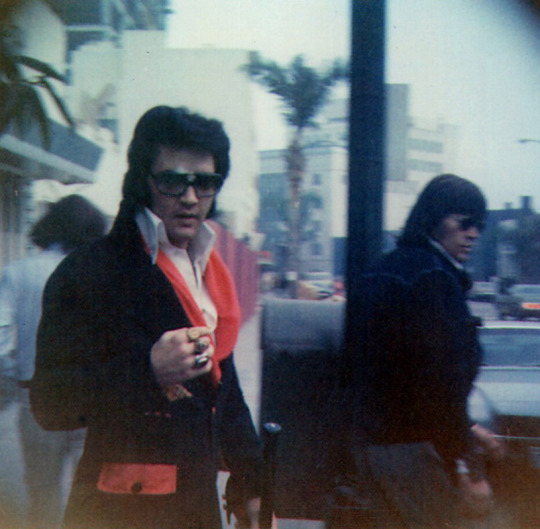
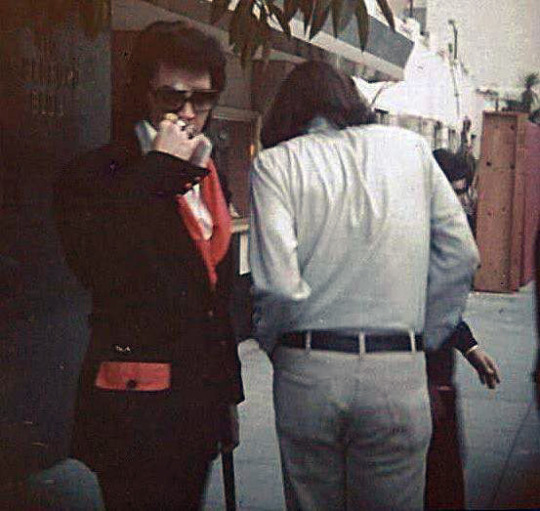
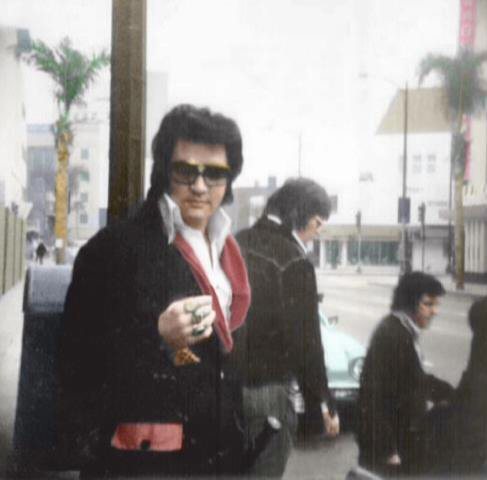
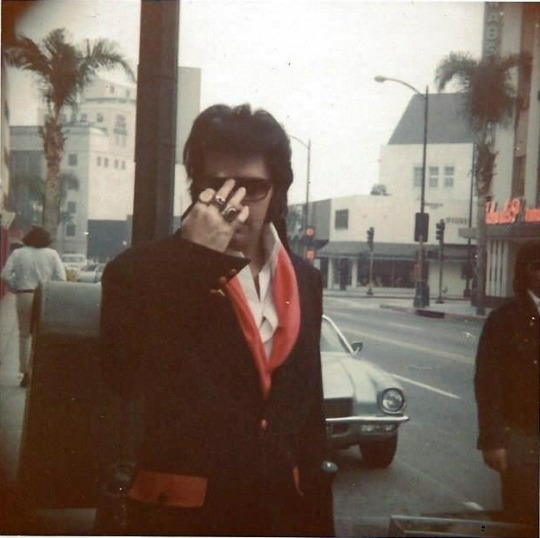
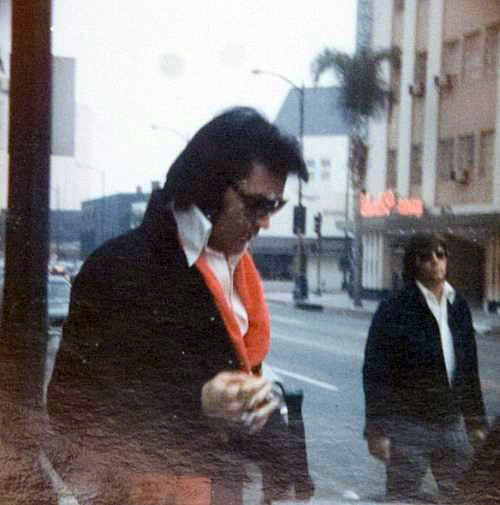
Elvis leaving an eye doctor's office in Beverly Hills sometime in late 1971.
That year, 1971, was the beginning for the dark sunglasses era. Elvis took it all lightly, joking around with people about his serious health condition. One of those people was Kathy Westmoreland, to whom Elvis said, after showing her his collection of sun glasses:
"If I have to wear the damn things," Elvis smiled, making fun of himself, "I'm gonna have one in every color." Excerpt from "Elvis and Kathy" by Kathy Westmoreland (1987).
After the brief hospitalization and the emergency eye treatment, Elvis got right back into the recording studio in Nashville considerably fast.
— A LITTLE BIT OF THE RECORDING SESSION ON MAY 19, 1971 WHEN "IT’S STILL HERE" WAS RECORDED: During the day Elvis slept, but for most of the members of the band it was business as usual—sessions all morning and afternoon. When they came back to work nights with Elvis, Felton had an unwritten rule prohibiting anyone from yawning in the studio—for fear that it might “bring down” his star—and he insisted that the musicians take their breaks in the parking lot. And even Elvis made a trip to their “outdoor lounge” when he became bogged down in “Seeing Is Believing,” a new tune Red West had just frantically completed. Otherwise, though, he kept focused throughout the evening, actively directing the band, patiently discussing the backing parts with the female singers. Jerry Reed’s “A Thing Called Love” was completed with an elaborate vocal arrangement that featured bass singer Armond Morales in a unison part with Elvis throughout the song. References to the previous evening’s gunplay were flying, and after a while Elvis noticed how upset the Imperials became whenever he struck a karate pose. It was another night of good-humored ad-libbing. “He left the splendor of RCA—of Victor,” he sang self-referentially after one verse of “Listen To The Bells”; “went back to Sun Records. …” The next take of “A Thing Called Love” collapsed, and Felton as always deflected blame from Elvis onto the newcomer, Joe Moscheo. But Elvis, ever gracious when he was in good spirits, just changed the opening line of the song from “Six foot six, he stood on the ground” to “Three foot four …” and dedicated the song to Charlie Hodge. After the meal break the atmosphere changed. Determined to capture the mood he achieved while performing at home, Elvis sat down at the piano for an impassioned yet unassuming solo set. Two of the three songs he chose had been favorites as far back as his days in Germany: “I’ll Take You Home Again Kathleen” and Ivory Joe Hunter’s “I Will Be True,” both of which he’d recorded on his home equipment in Bad Nauheim. This old material was hardly what Felton or RCA were looking for in an Elvis session, but Al Pachucki was ready with the tapes rolling just the same. The most moving of the three was another Ivory Joe Hunter song, “It’s Still Here,” but later Felton excitedly reported to the Colonel that with overdubs they all would make “great tunes,” keen to convince both Elvis and his manager of their commercial potential.
Excerpt: "Elvis Presley, A Life in Music: The Complete Recording Sessions" by Ernst Jorgensen. Foreword by Peter Guralnick (1998)
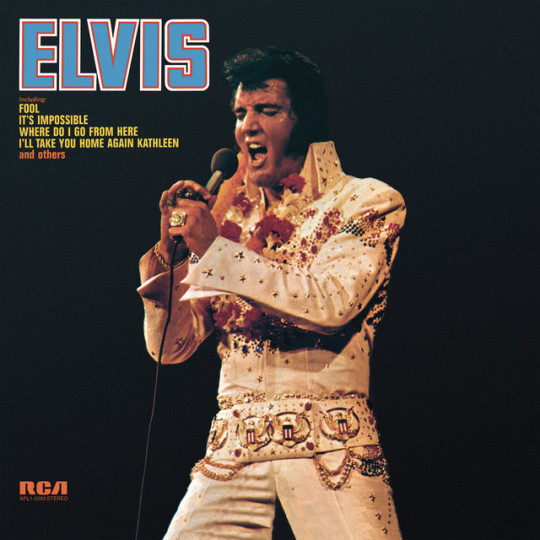
AFTERMATH Five albums were out a while before the "Elvis (Fool)" album could be released in 1973. Following the 1971 Christmas album was the contemporary music album, "Elvis Now", and then the gospel album "He Touched Me" preceding two live record releases, the "Elvis: As Recorded At Madison Square Garden" (1972) and the "Aloha From Hawaii Via Satellite" (1973) albums, and just then the "Elvis (Fool)" album was made by putting together songs recorded during the May 1971 recording session as well as songs taped during recording sessions in February-March 1972.
youtube
"IT'S STILL HERE" — LYRICS Songwriter: Ivory Joe Hunter The day you said we'd never part You turned around and broke my heart You had the nerve to tell me I would soon forget Now you've been gone away one year And I have not forgotten dear The love I had for you so long Is still here Wow-oh It's here, still here Because my heart cannot believe We're really through And though you said we'd never part You turned around and broke my heart The love I had for you so long Is still here It's here, still here Because my heart cannot believe We're really through Now you've been gone away one year And I have not forgotten dear The love I had for you so long Is still here Wow-oh It's here, it's here, still here Because my heart cannot believe We're really through And though you said we'd never part You turned around and broke my heart The love I had for you so long Is still here Wow-ow It's here, still here Because my heart cannot believe We're really through And though you said we'd never part You turned around and broke my heart The love I had for you so long Is still here Oh yeah
UNEDITED MASTER (4:45)
youtube
ORIGINAL RECORDING Ivory Joe Hunter (1968)
youtube
#this is a gem#elvis presley#elvis history#elvis music#ivory joe hunter#1968#1971#1973#elvis#70s elvis#elvis discography#elvis songs#it's still here#elvis the king#Spotify#Youtube
25 notes
·
View notes